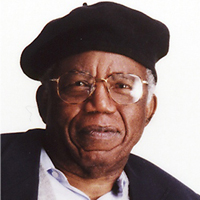Colonialist Criticism by Chinua Achebe: Critical Commentary
Chinua Achebe in 'Colonialist Criticism' vehemently criticizes the failure of European criticism to understand the African literature on its own terms. He powerfully attacks the sense of superiority found in colonialist critic who sees the African literature on its own terms.

Chenua Achebe
The latter-day colonist critic, equally given to big brother arrogance, sees the African writer as a "somewhat unfinished European" who will with particular guidance will grow up one day and write like every other European. The arrogance is traceable to the colonial doctrine of the white man’s burden itself: European civilizes the savage Africans. The superiority allows for the luxury of knowledge, which the colonialist critic uses to control the African writing in English. The arrogant European says that they civilize the savage Africans. Being so called superior they get abundance of knowledge with which they control African literature in English. Achebe writes: “To the colonist mind it was always of the utmost importance to be able to say: ‘I know my natives,’ a claim which implied two things at once: a) The native was really quite simple and b) Understanding him and controlling him went hand in hand, understanding being a pre-condition for control and control constituting adequate proof of understanding.” He, therefore, urges the colonist critic to be purged of the superiority and arrogance which history so insidiously makes him heir to.
He rejects any idea of writing like a western author i.e. he rejects the myth of universalism. As an African writer, he will always remain true to African historicity. He is of the opinion that every literature must seek the things that belong unto its people, and must speak of a particular place. Rejecting the myth of universalism, Achebe stands in favor of localization. He is of the opinion that colonized should begin to write their own history ignoring what has already been mythologized. He demands earnestness of the writer to his time, circumstances, locality and historicity.
Chinua Achebe criticizes African and British critics of contemporary African literature for ignoring the particularity of the African experience and for praising universality whenever they sense its presence: for praising fiction, in particular, that transcends African parochialism, although set in Africa, and deals with the universally human, even though its characters happen to be Africans. Achebe’s point, of course, is that the colonialist critics- a term apparently indicating all western critics of African literature – do not really have any conception of the universally human. They say universal, but they mean, without knowing it, “Western”, or “like us”. “I should like to see,” Achebe writes, “the word universal banned altogether from discussions of African literature, until such a time as people cease to use it as a synonym for the narrow, self-serving parochialism of Europe.”
What bothers Achebe most is not what the colonialists say or think, but the fact that their criticism exerts an influence on African writers. Good literature, indeed, real literature, had to be universal, and when African writers look at their continent in the past or the present or even the future, universality seems in short supply. This vital essence evidently belongs to Europe and is most fully accessible in the European novel. The trick seems, then, to appropriate what has been done there, but African writers want to write about Africa, and Africa is not Europe. It’s not different in a fundamental way, humanity always been fundamentally the same – there were still some differences only a moron can ignore.
The culturally colonized African intellectuals think that western culture, art and literature are superior to their African native culture. He views that westerners write the text based on African writers and African subject matter with the intention of colonization. Through the text, they circulate power and create certain truths for African. As a result, westerners control over them, but African writers are not aware of the fact of being colonized. For Achebe, evidence of the autonomy and uniqueness of African literature from its European counterpart can be seen, for example, in the very different role that the African writer must have toward his or her society. He attacks the notion that the African writer should adopt the Western Modernist pose of the angst-ridden writer living on the fringes of society. The African novelist has an obligation to educate, to help society regain belief in itself and put away the complexes of the years of denigration and self-abusement.
Summing up, literature for Achebe, is a function of society. He puts literature in service for the need to alter specific things in specific places especially attitudes. It is in this context that he attacks universalism and pitches in for social earnestness on the part of African writers.
Colonialist Criticism Reading
Colonialist Criticism: Critical Interpretation
Coloniasist Criticism: Summary
 |
bachelorandmaster.com |